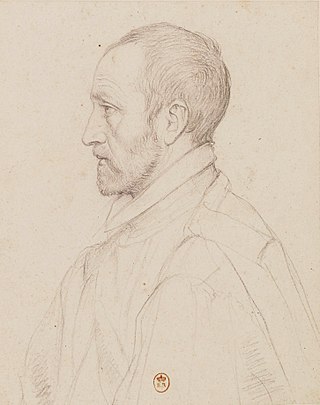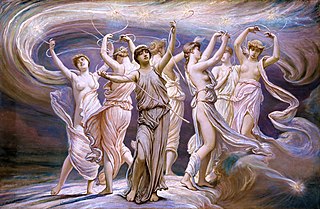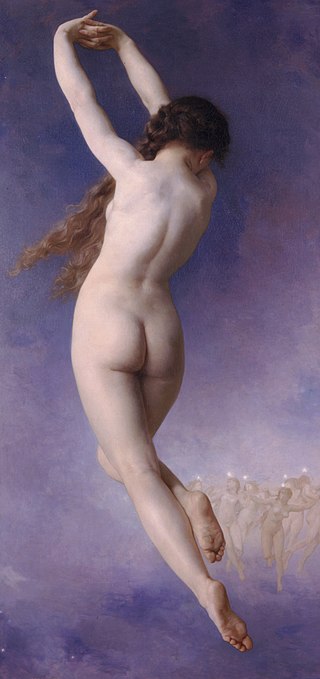The Pleiades are an open cluster of stars in the constellation Taurus.
Contents
Pleiades may also refer to:
- Pleiades (Greek mythology), seven sisters of Greek mythology
The Pleiades are an open cluster of stars in the constellation Taurus.
Pleiades may also refer to:
An atlas is a collection of maps.
Orion may refer to:
Seven Sisters may refer to:

The Pleiades, also known as the Seven Sisters, Messier 45, and other names by different cultures, is an asterism and an open star cluster containing middle-aged, hot B-type stars in the north-west of the constellation Taurus. At a distance of about 444 light years, it is among the nearest star clusters to Earth. It is the nearest Messier object to Earth, and is the most obvious cluster to the naked eye in the night sky. It is also observed to house the reflection nebula NGC 1432, an HII region.
Pleione may refer to:

Jean Daurat was a French poet, scholar and a member of a group known as The Pléiade.

In Greek mythology, Orion was a giant huntsman whom Zeus placed among the stars as the constellation of Orion.
La Pléiade was a group of 16th-century French Renaissance poets whose principal members were Pierre de Ronsard, Joachim du Bellay and Jean-Antoine de Baïf. The name was a reference to another literary group, the original Alexandrian Pleiad of seven Alexandrian poets and tragedians, corresponding to the seven stars of the Pleiades star cluster.
In Greek mythology, Athena is a goddess of wisdom, strategic-war and weaving.
Intrepid, Intrepida, Intrepide, Intrepido, or similar, may refer to:

The Pleiades, were the seven sister-nymphs, companions of Artemis, the goddess of the hunt. Together with their sisters, the Hyades, they were called the Atlantides, Dodonides, or Nysiades, nursemaids and teachers of the infant Dionysus. The Pleiades were thought to have been translated to the night sky as a cluster of stars, the Pleiades, and were associated with rain.
Hydra generally refers to:

Remy Belleau was a poet of the French Renaissance. He is most known for his paradoxical poems of praise for simple things and his poems about precious stones.

The Order of La Pléiade is an honorary order of the Organisation internationale de la Francophonie. It recognizes people who particularly distinguished themselves in the service of its ideals of cooperation and friendship, promoting the role of the French language in their own countries or in the world. It was created in 1976 on initiative of the Assemblée parlementaire de la Francophonie.
Merope was originally the name of several, probably unrelated, characters in Greek mythology. The name may refer to:
Nationality words link to articles with information on the nation's poetry or literature.

High visibility of the star cluster Pleiades in the night sky and its position along the ecliptic has given it importance in many cultures, ancient and modern. Its heliacal rising, which moves through the seasons over millennia was nonetheless a date of folklore or ritual for various ancestral groups, so too its yearly heliacal setting.

In Greek mythology, Merope is one of the seven Pleiades, daughters of Atlas and Pleione. Pleione, their mother, is the daughter of Oceanus and Tethys and is the protector of sailors. Their transformation into the star cluster known as the Pleiades is the subject of various myths.

Elements of Greek mythology appear many times in culture, including pop culture. The Greek myths spread beyond the Hellenistic world when adopted into the culture of ancient Rome, and Western cultural movements have frequently incorporated them ever since, particularly since the Renaissance. Mythological elements feature in Renaissance art and in English poems, as well as in film and in other literature, and in songs and commercials. Along with the Bible and the classics-saturated works of Shakespeare, the myths of Greece and Rome have been the major "touchstone" in Western culture for the past 500 years.
Philomel is another name for Philomela, a character from Greek mythology. It may refer to: